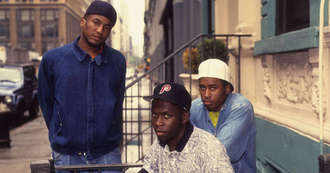NewsSeptember, 29 The Guardian view on A Tribe Called Quest: time to pay tribute to the greats
Thirty years ago this week, one of the best and most influential albums of all time was released – and it is not the one you are thinking of. While Nirvana’s Nevermind has garnered the headlines and BBC airtime, there is another album of exactly the same vintage that also defined a genre. The Low End Theory by A Tribe Called Quest has shaped the history of hip-hop like few other records before or since. It was the first album ever bought by Kanye West (“Tribe made Kanye,” he has said). Listening to it inspired Dr Dre to make The Chronic. It launched the career of Busta Rhymes, who pops up on the traditional posse cut at the end of the album and proceeds to let off a series of verbal fireworks (“Raarr, rarr / like a dungeon dragon,” indeed). Of its producer, Q-Tip, Pharrell Williams has said: “We’re all his sons. Myself, [producer] J Dilla, Kanye, we wouldn’t be here if it wasn’t for Tribe albums.” Add to that list Outkast, The Roots, Gangstarr … Yet, at the time what stood out was how odd The Low End Theory sounded compared with everything else in the shops. It was not half as poppy as Tribe’s initial salvoes, such as Can I Kick It? with its Lou Reed sample. Nor did it have the bombast of the titans of late 1980s hip-hop, whether that be the alpha male stylings of LL Cool J or Public Enemy’s wall of paranoiac sound. Instead, this album sounded spare, centring on bass and drum parts taken from jazz musicians such as Art Blakey and Ron Carter. In 1991, jazz was almost uncharted terrain for hip-hop, which preferred to mine old funk and soul. After this album, all that changed. Above those low-end sounds mused Q-Tip and Phife Dawg. The two had very different personas: Q-Tip was light, flexible, the “Abstract Poetic”, as he called himself, while Phife styled himself as a “Trini-gladiator” – but also talked openly about how riding on the train “with no dough” in a city as overcrowded as New York felt “like a migraine pounding”. Would-be gangsters they were not, but they were often introspective, quietly political and cerebral. Q-Tip had a dexterity and suppleness few other rappers have equalled, so that even today he is ranked among the giants of the genre, but his relationship with the earthier Phife was almost telepathic. On tracks such as Vibes and Stuff, they did not so much trade verses as slide over each other’s words in a kind of sonic haze. “You on point, Phife?,” called Q-Tip. “All the time, Tip,” responded Phife. “Well then, grab the microphone and let your words rip.” Until comparatively recently, black music and dance music rarely got the commercial or media interest accorded to boys with guitars. Critically, the press will devote pages to the death of the Rolling Stones’ drummer Charlie Watts, while proving far more reticent over an innovative genius such as Lee “Scratch” Perry. It is true that dub and hip-hop and house music often proceed iteratively, through remixes and tweaks, rather than by big landmark releases. But what riches – including The Low End Theory – these genres have produced.
Photo: Photograph: Al Pereira/Getty Images
September, 30
September, 30
September, 29
September, 29
September, 29
September, 27 |
||
|
|
||